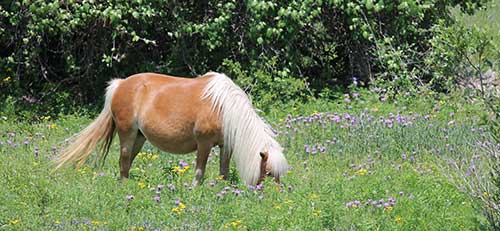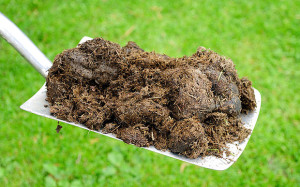
Photo courtesy deandfw-Pixabay
a three-part series on worms and horses

Photo courtesy
deandfw-Pixabay
The following is the third of a three-part series on worms and horses, co-authored by Ellen Collinson and Alex Wilson. You can find the article in it’s entirety, as well as other articles and information on iridology, herbs, and nutrition for horses on *Ellen’s website.
|
1. Herbal Worming The use of herbal remedies or herbal medicines is thought of today as alternative, but if we examine the evidence, in reality it is the chemical products that should be termed as alternative. Herbal medicine can be traced much further back than any modern chemical treatment. In fact, a large number of medicines used today have their basis in herbal remedies that can be traced from as far as the tribesmen of Africa, the ancient Egyptians and the Chinese. The first reports of herbal medicine can be dated as far back as 2800 BC in ancient China. By 400 BC the Greeks had also adopted the use of herbal medicines and by 100 BC the first reference book on herbs was written in Greece. By 50 AD, herbal medicine had spread to the Roman Empire and by 500 AD herbal medicine first came to Britain and was practiced throughout Saxon times. By 800 AD, herbs were being grown in monasteries in Britain and monks developed the usage of these remedies. At the time of the black death herbal remedies were used to try and contain the spread of the disease. In the 1500s, and during the reign of Henry Tudor, the first laws were passed to control the practice of herbal medicine to stop them being supplied by untrained apothecaries. In the 1600s, medicine in Britain was becoming two-tier, chemical based drugs for the rich and herbs for the poor. During this period and into the 1700s, many conventional drugs were being sold over the counter, but the realization of the terrible side effects was starting to become a reality. As we move into the modern era, there has been a large resurgence of herbal medicine, partially due to the side effects of chemical products, but also as in many cases natural products are in harmony with nature, so can be more effective. There are many products on the market claiming to be herbal parasite repellents that will have little if any effect, so it is always worth investigating what research has been conducted to back up their claims. There are herbs that are classed as Anthelmintics: these are herbs which have the capacity to destroy intestinal worms and parasites. They come in two categories: vermicides and vermifuges. The former are agents that destroy worms without necessarily causing their expulsion from the bowels and this category of herbs should be combined with laxative or cathartic herbs which then cause the expulsion of the destroyed parasites. Vermifuges are agents, usually having cathartic properties, which expel worms from the bowels. As well as Anthelmintics there are Taeniafuges and Taeniacides. These are herbs that expel (taeniafuges) or kill (taeniacides) tapeworms in the intestinal tract.
For a product to have a good combination, it must include these herbs and also a separate cathartic; this helps not only to loosen the bowels and work as a laxative but to clean the gut walls of the eggs and larvae. Also needed is a good demulcent: demulcent herbs act as a soothing agent to calm any inflamed or damaged tissue, and also to prevent any ‘side effects’ that a strong anthelmintic, especially chemical anthelmintics, can cause. And last, but not least, it would contain a stimulant to prompt the herbs to work as a formulation. As many anthelmintic herbs are very bitter and cathartics very strong, it is usually a good practice to add a herb that has both a palatable flavour as well as a pleasant aroma; this can be the chosen stimulant or demulcent. Through in vivo trials conducted at the Institute of Organic Research in Switzerland, it has been proven that certain herbs show a significant activity with a 79% reduction in egg output on day five of feeding it and a 100% cessation of egg hatch. The trials also show that the anthelmintic activity either killed or paralyzed the larvae so they cannot climb up the grass to be eaten by a new host. This stops the cycle and also prevents the build up of resistance. It has also been proven in recent trials conducted in the wild, that herbal parasite repellents do not cause any damage to wildlife, the water or the environment. It is however, essential that before buying a herbal parasite repellent, you check that it has been properly trialed, and that the results prove that it can be used as either a complete wormer or as part of a worming program Controlling parasites on a property can go beyond a good worming program and the following ideas can certainly help control parasites. Any new horses arriving, before they are allowed to graze with the other horses, should be isolated for 48 hours and wormed. It is important to know what worming has been done at the property the horse is coming from and if any infestation is known to be a problem there. Even if you are informed that the horse is worm free; do not take that information as gospel and conduct your own worming. Herbal parasite repellents are often good for this situation as you can be confident of not overdosing a horse or giving them a product that might conflict with what they might have been given recently. During the 48 hour period make sure that all droppings are removed and either have the dung removed from the property or use it as a garden fertilizer so that it is kept away from other horses.  A general consideration is to make sure that paddocks are kept as free from droppings as possible and that will help stop the parasites’ life cycles. Many yards and stud farms use special paddock vacuum cleaners to remove droppings. Again make sure that dropping are disposed of and do not get back in direct contact with horses. Fecal egg counts can also be a very useful tool, and consider the fact that if you have a horse with a large worm burden it is advisable to isolate it from the rest of the herd.
In conclusion
Credits
Acknowledgements
|
Do you
have a topic you would like to see here or article you'd like to submit?
Please
E-mail me
We wish to thank all of the people that have shared their experiences &
knowledge with others by sending us tips and donating articles. For articles on
our pages that have been reproduced, credit is given and a link is posted to
your site (reproducing articles archives information on our server which
decreases broken links that occur when content on the site was either removed or
relocated without proper redirects in place to lead visitors to the correct
page.)
Please forgive us if we did not give full credit for any one of the wonderful articles
here. If we have used something of yours
that you would like removed please let me know.
All rights reserved. No part of any pages may be reproduced in any form or
means without written permission of Lil Beginnings Miniature Horses.
Lil Beginnings Miniature Horses is not responsible for any death, injuries, loss, or other damages which may result from the use of the information in
our pages.